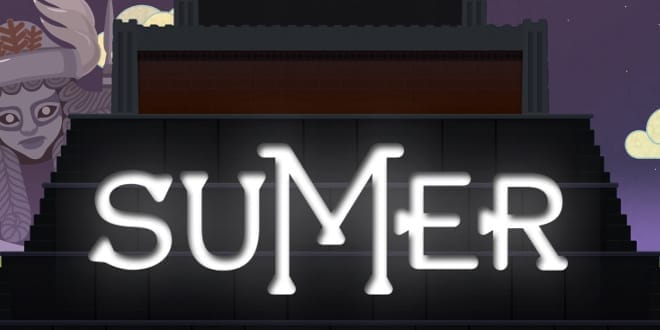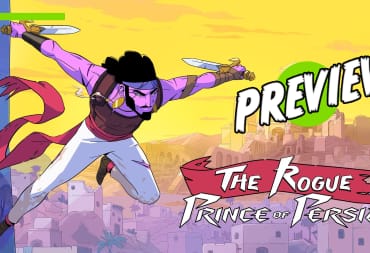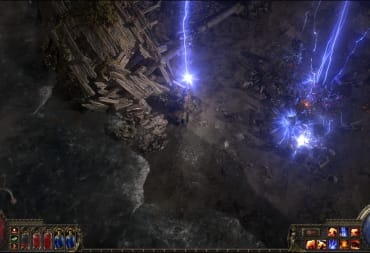If you've got some friends over and you want to all play a video game together, there's an awful lot of multiplayer titles to choose from. Many of them have a serious focus on combat and derive from fighting games and beat 'em ups.
A smaller and somewhat neglected segment of multiplayer video games is the digital board game - something that has elements of a tabletop classic but also incorporates distinct real-time gaming mechanics in a way similar to Mario Party. Sumer is one such digital board game.
https://www.youtube.com/watch?v=cUWQo-o1k-Y Sumer (developed by Studio Wumpus) is a digital board game for one to four players. You play as a Sumerian noble who is trying to gain the favor of the gods through various means such as completing rituals or building statues.
The gameplay of Sumer is divided by rounds. Each day, you and your three opponents will run around a ziggurat trying to make the best use of your workers and the available resources. Each night will consist of an auction where players bid goats to acquire new rooms for the ziggurat, statues to control territory, and other bonuses.
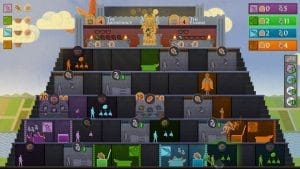
A game of Sumer begins with selecting your character and optionally entering your initials. Players are then dropped into the ziggurat to start the first round. At the start of the game, the temple has a bedroom for each player, a Bakery, Goat Farms, Barley Shops, and two distinct altars at the top. Each player has two workers that they can assign to one of these buildings on a first come, first served basis.
Barley Shops will get the player a single Barley resource per worker the following round. Bakeries convert Barley into Bread, and points are given to players who have made Bread as well as a bonus for the player who has made the most. Goats are the currency of the game, and Goat Farms will give players some Goats. Moreover, Goat Farms will grow in the number of Goats they have the longer they remain untouched by players making them a juicier prospect as the game goes on.
The altars at the top of the ziggurat are arguably the most important part of Sumer. Each of the two altars has a distinct "ritual" assigned to them where players must attempt to provide a certain amount of different items to each altar. The altars at the beginning only require Barley, but subsequent rounds will mix things up and require goods which have more involved production. Points are awarded to the player who places the last item in the ritual and a greater bonus is given to the player who contributed the most to the ritual overall.
The beds serve as the spawn point for each of the nobles. In addition to the scramble to get to resources before the other players, a bonus is given to the players based on who went to bed first. It's not enough to risk not making the best use of the two workers that you have at the beginning of the game, but the bonus is sufficient that you'll want not to waste any time getting everything done. The sun in the background also acts as a timer; if it completely runs down the turn ends whether or not the players have placed their workers.
The round ends once both of the rituals have completed and either the sun goes down or all the players are in their beds. The last goods are collected from placed workers, and the game moves into the next phase - the auction.
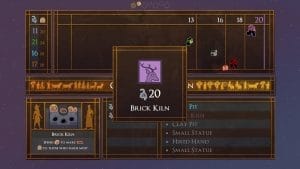
The auction is where players can acquire several different buildings and other bonuses. Statues can be purchased to provide bonuses to a sort of territory score; players are incentivized to try and keep all of their territory linked up in one continuous block. New shops such as Clay Pits introduce new resources into the game for the more complex rituals of the mid to late game. The Brick Pit comes in during the first auction and acts similar to the Bakery; it processes clay into Bricks and provides a score bonus for the player who contributed the most bricks as well as fewer points to players who contributed a portion of that round's bricks. An additional smaller bedroom is also an option for players who are keen on finishing their rounds quickly and would like to cut down on the distance running back to their bed. Building placement operates on a similar 'first come, first served" basis so there is a race even in this respect.
Aside from purchasing buildings, players can also acquire a "hired hand" which effectively gives them a third worker.Players can also buy wings which will allow them to move faster overall.
All purchases in the auction are done in a similar hectic fashion as the core gameplay. Players bid by sliding a bar either to the left or right for higher or lower bids. Quite simply the highest bid wins, but a meta strategy can happen here. An approach I sometimes used was baiting players (either real or AI) into bidding high and then pulling back at the last second so they would spend as many goats as I could get them to. This allowed me to purchase the thing I wanted with greater ease. There's also the double-layered bluff of pulling back and the jumping forward at the very last moment to edge out a bid.
Six different things are available in each auction round, and all of them are useful, but players will likely develop a strategy and focus on various things. Players who want to link up a lot of territories will need statues to fill the smaller gaps between production rooms. Ultimately, a lot of goats typically results in a lot of buildings as it doesn't cost very many goats to get the day-to-day tasks done in Sumer. Indeed, one player in my playtests regularly had more goats than the next two players combined and he ended up dominating most of the map with his buildings.
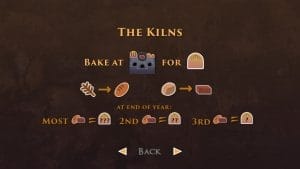
One interesting note I'd like to make about Sumer is just how terribly close every game has been. The default scoring scheme only shows you how many points you've acquired each round and so the players genuinely didn't know who was ahead or who wasn't. My quiet predictions for the winner were wrong in both of the four-player playtests that I had done and the scores were all terribly close. I think one of the strengths of Sumer is the variety of strategies players can undertake and how it can all play out in the end. You can absolute dominate in controlling territory and own half the temple and yet still manage to lose by a handful of points because another player managed to score more important bonuses elsewhere. The matches I played by myself against AI also followed a similar pattern.
Visually, Sumer is quite pretty. It has a simple and clean style that's evocative of the sort of ancient art you'd expect to see in real-world temples. I don't expect it to be graphically demanding for most players all things considered. That said, it ran smooth as butter for me every time on both PCs I tried it on with no noticeable graphic hiccups or frame drops.
The music in Sumer compliments the game well. The auction music, in particular, is great for getting players excited about the bidding. It starts off subtly and layers on heavier string plucks and percussion as you get closer to the end of the auction timer before finally expiring in a glorious crescendo once the results have been revealed. I'm sure experienced players will make use of the tune in judging the correct time to make that last move towards a winning bid.
Sumer is a pretty tight package as it stands overall. I was provided two separate preview builds. The one I was given late last year was used for real-world multiplayer testing. I played two rounds of the game with six people total (including myself), and everything ran well with a bunch of USB controllers plugged into a friend's PC. A later build was a fair bit more polished with additional animations, more sounds, and an overall more impressive visual presentation.
The original build of the game had a handful of options such as selecting the length of the game, and the newer build added a fair bit more. There were silly things like a "Big Head" mode as well as more significant changes such as the option to have the score shown on a per-round or cumulative basis.
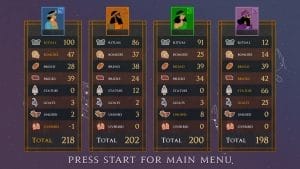
Sumer has some degree of randomization in it. Aside from what things the game offers regarding starting position and the auction items, the players will inevitably buy different things and place them in various spots in the ziggurat every time. These gameplay elements come together in such a way that no two games of Sumer will ever really be the same.
The game also wasn't terribly difficult for people to pick up. My playtesting group had never heard of the game before I told them about it; I only mentioned to them that I would be bringing a game that needed a PC and multiple USB controllers. I had everyone watch a video showcasing the basics of the gameplay, and we jumped right into it. (Do note that that is an older video compared to the more recent gameplay basics tutorial currently listed on their Kickstarter.) I came in second place both times despite knowing the mechanics of the game better, and every game had me on the edge of my seat trying to nab just a little more favor than my opponents.
A game of Sumer will take twenty to thirty minutes from start to finish. There's no worry about spending all night playing unless you want to, and you can set the length of individual games to tinker with your experience to your heart's content.
Sumer was terribly exciting to play. Sure, there's a grand strategy involved - perhaps you'll try to dominate the Bakery this round as well as throw in a bit towards the rituals for some bonus points. Maybe you'd like to try to grab as many goats as possible and clean up in the auction in-between the regular gameplay. Much like war, all of these plans fall apart once things start moving and you'll often find yourself having to make another decision on the fly because the last Clay Pit was occupied a split second before you got to it. Excellent platforming skills will aid you in acquiring the specific resources that you want to. Thankfully, there are enough rooms in the game that it's rare for someone to be left out in the cold with a worker and nothing to place it on.
My only major criticism of Sumer is that it currently lacks online multiplayer. At the time of this writing, Studio Wumpus is running a Kickstarter for Sumer to raise funds for implementing and testing online multiplayer as well as adding the finishing touches to the title.

Sumer, as it stands right now, is a fine game. Judging by its current state I think it would make a worthwhile addition to your game library despite the lack of online multiplayer - it's an awful lot of fun to play with your friends in person or just to play it by yourself. A $15 pledge on their Kickstarter seems like a fair price to me, and I imagine the game will likely launch around that price range once it's on Steam Early Access.
And don't let "Steam Early Access" or the Kickstarter worry you - the game is a very solid, nearly complete experience. The core gameplay is tight. I'd happily recommend getting it if this is the sort of thing you're into. What's in Sumer now is already a darn fine game, and I think it will only get better as Studio Wumpus puts the finishing touches on it.
Sumer was previewed on PC with a copy provided by the developer.
What do you think of Sumer? Does it seem like the sort of game that would be fun to play with some friends? Let us know in the comments below!
Previews you can trust: To ensure you're getting a fair, accurate, and informed review, our experienced team spends a significant amount of time on everything we preview. Read more about how we review games and products.
Have a tip, or want to point out something we missed? Leave a Comment or e-mail us at tips@techraptor.net
